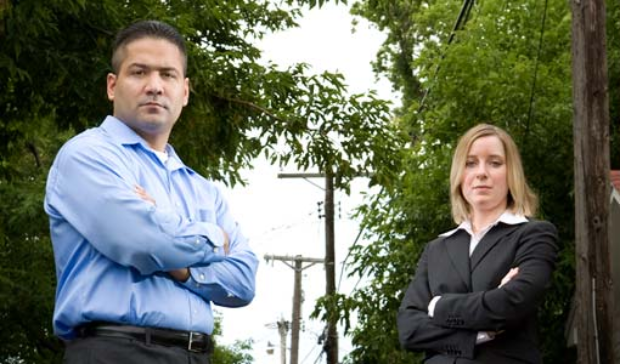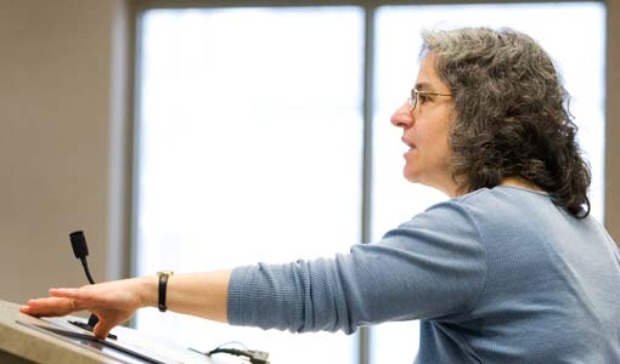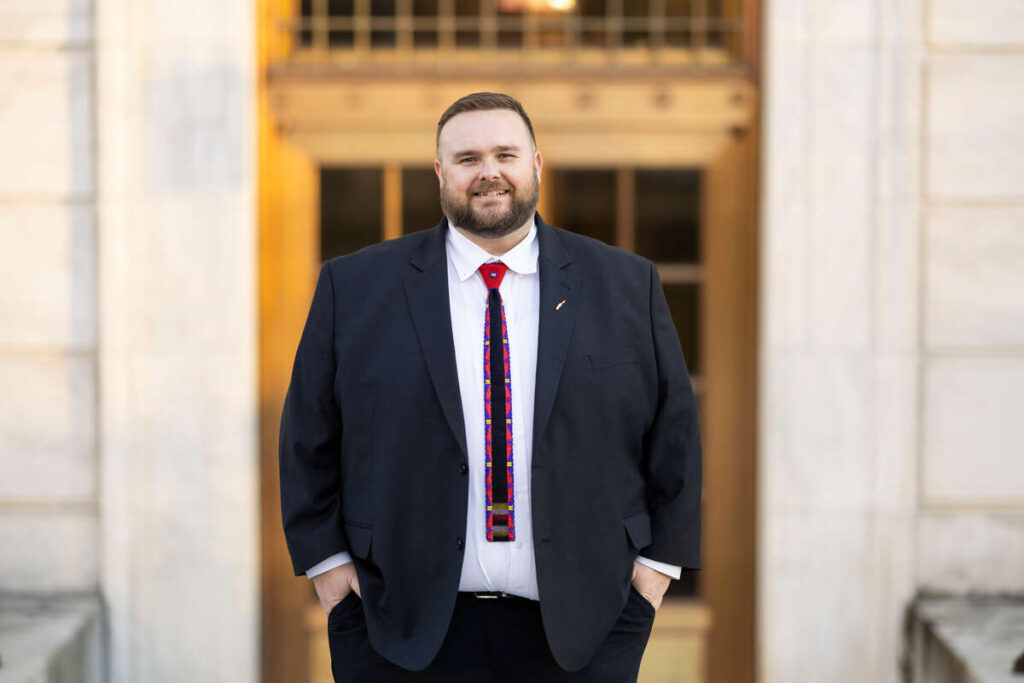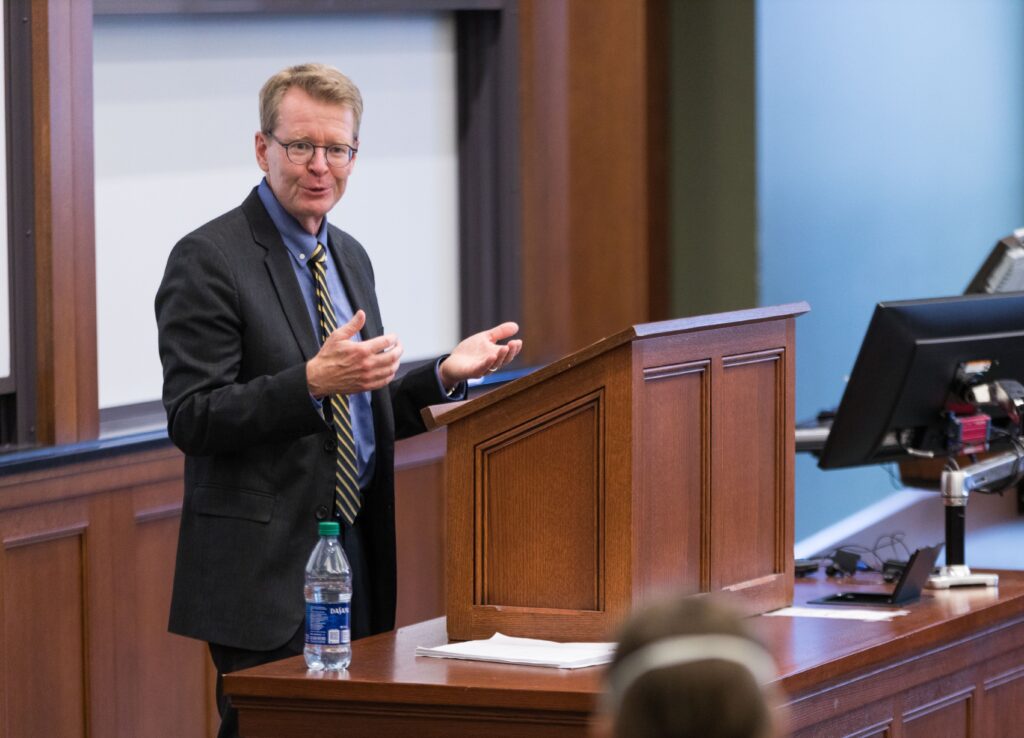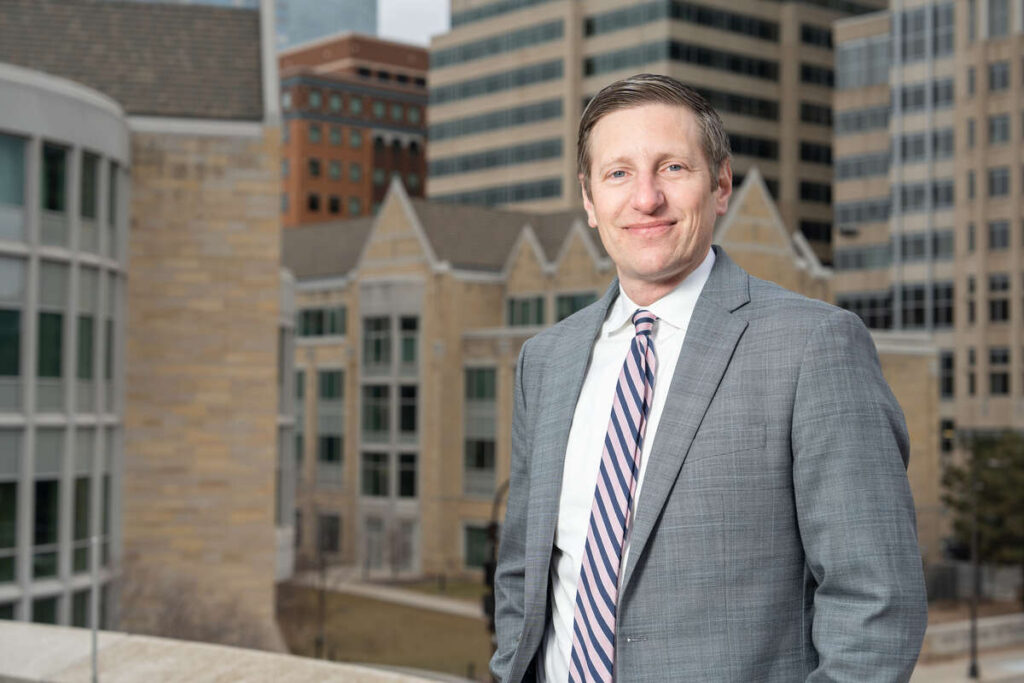Kelvin stood up at a town meeting, ready to share his story. He held a thick stack of business cards given to him during a prison job-fair less than a year ago. The businesses had encouraged him to call, but 90 days out of prison Kelvin had no job and no place to live. He said his 15-year-old son, who joined a gang, told him, “When you get a job, I’ll get a job.”
Kelvin is one of the men that the School of Law’s Community Justice Project aims to serve by creating Brotherhood Inc.
Four University of St. Thomas law students, associate professor Nekima Levy-Pounds and law clinic fellow Artika Tyner are proposing this bold solution. Building a center in St. Paul to serve African-American youth, particularly those who had interacted with the criminal justice system, is at the heart of their vision. The plans for the center include $860,000 worth of land they don’t yet have funding for and then building a one-stop shop for social services and several business enterprises ranging from commercial printing to a barber shop. The target clientele are those who have been involved in gangs or criminal activity, and are willing to make positive changes. The program also focuses on prevention.
Homeboy Industries in Los Angeles is the model the group has adopted. Giving it a St. Paul spin, the group has named its project Brotherhood Inc. and added the tagline “Creating Change, Transforming Lives.” Everything about the plan is ambitious, starting with the mission statement, “To enable African-American youth and young adults to envision and achieve successful futures.” Backing this up is a three-phase plan with goals through 2014.
Law students Luis Verdeja, Dan Olson, Erin Lord and Nicole Concordia were assigned to the Brotherhood Inc. project as part of their enrollment in the Community Justice Project. Led by Levy-Pounds, the CJP is one facet of the St. Thomas Interprofessional Center for Counseling and Legal Services that serves the community and allows students opportunities to practice in the areas of immigration and elder law. The center is a unique place where clients can access the resources of graduate students in social work, psychology and law.
The Brotherhood Inc. project not only will impact the lives of many in the community, but already has affected the law students’ lives. They seem uniquely qualified to speak about change, particularly in regard to attitudes of race and social justice, because the work changed them first.
The Organizer: Dan Olson
Dan Olson grew up in Eagan, Minn., and credits both his parents and the diversity among his friends with giving him a sense of how to value people for “the content of their character.” The law-student group described Olson as the organizer, and he demonstrated that on a snowy February day in downtown St. Paul when he delivered a summary of the Brotherhood Inc. proposal to Mayor Chris Coleman, Police Chief John Harrington, several county commissioners and a virtual who’s who of the non-profit world in the Twin Cities.
Olson was at the front of the room to give people a first-hand look at what he and Verdeja had seen when they flew to Los Angeles to visit Homeboy Industries. After meeting with a number of people at Homeboy Industries, Olson left with an appreciation of his blessings. He was particularly struck by his time with two peer navigators, men who had reached a level of success in the program and mentored those new to the center.
Olson realized that these men had to travel a much different path than he had, to get where they were. He found their stories heartbreaking, and he understood that these men weren’t just products of their own choices. They also were affected by broken families, chronic poverty and social structures. One of the peer navigators told Olson, “Some people look at my tattoos and judge me, but they don’t understand that my dad got drunk and beat the hell out of my mom because she wouldn’t have sex with him.”
“That’s a shocking thing for a kid from suburban Minnesota to hear,” Olson said. As someone who credits his parents with providing him with a good upbringing, Olson said it was hard for him to comprehend what it would be like to succeed as a person in that environment.
Olson found a talk by Homeboy Industries founder Father Gregory Boyle, S.J., to be a life-changing experience. His time in Los Angeles convinced him that the model can work in St. Paul. It also convinced him that there is something different about the program. He and the others point to the program’s open-door policy, which means that a client who drops out for any reason, can return at any time. “It’s having someone say to them, ‘Look, there is a real likelihood that you are going to screw up again but I’m still going to be here for you because I believe you can make the change you are seeking,’” Olson said.
Olson is quick to point out that it is more than just moving services to one building. The difference is in the way services are constructed and delivered and in the integration of faith. While in Los Angeles, he was struck by how enemies from former gang lives now traded high fives and joked around. “The collegiality was eye-opening, and I think that’s what happens when you believe in someone: They believe in others and that’s the strength of the program.”
The Heart: Luis Verdeja
When Levy-Pounds presented the options within the Community Justice Project, Luis Verdeja immediately hoped that he would be assigned to the team working with Homeboy Industries. Verdeja calls the timing of the project providential. Entering his third year of law school, he had started to wonder why he wanted to become a lawyer. Being involved in the Brotherhood Inc. project refocused him and gave him a vision for a future beyond graduation.
Described by the group as the heart of the project, Verdeja is the only student to have grown up in St. Paul in some of the neighborhoods that will be served by the project. He also comes from the most culturally diverse family, with roots that are Mexican-American, French, Irish-Catholic and African-American. The issue of re-entry is personal for Verdeja – his father and uncle are convicted felons. “Neither of them has successfully re-entered society after getting released from prison, despite sincere attempts to do so. Seeing Homeboy Industries gives me quite a bit of hope for them, despite their age.”
Verdeja traveled with Olson to California to visit Homeboy Industries. He said that was critical, because the more he read about the project the more he realized that this shouldn’t work – but it does.
“The biggest thing is that you saw Christ’s love throughout, even though it is not a religious organization,” Verdeja said. He also noted that he had heard corporate America talk about buy-in but he had never seen it in the way he saw it at Homeboy Industries.
The conversation with the peer navigators was also a key experience for him. He realized that they wanted straight talk. It was also in that meeting that he saw how much Olson cared about the project, and that he and Olson both became engaged in the project in such a way that it transcended the racial differences in the room.
That trip to Los Angeles led Verdeja to go back and re-read the essay he had written to get into law school. In it, he found a place of grounding.
“Transformation is possible for people” is the most important thing Verdeja learned in Los Angeles. He compared the open-door policy of Homeboy Industries to the open arms of Christ. It encouraged him to see how the individuals involved keep getting up each time they fall and how they work through their problems. Verdeja said he could see why Father Boyle does what he does, because “conversion is always possible.” Verdeja related the power of Homeboy Industries to the School of Law. While he stated that neither is “in your face,” they infuse Christ’s love into the place, and that leads to transformation.
“They came back ignited. It was a powerful thing to watch them,” Tyner commented about Verdeja and Olson’s return from Los Angeles.
Verdeja talks about Brotherhood Inc. as a reality. He almost seems surprised by the question about what’s next, because he is so confident that it will continue.
One of the things this project will mean for Verdeja in the future is that he will have a place to refer people. “Regardless of what I’m in, you still come across people who need help.” He said he will relate better to people because of the experience but is focused on how it will help the community. He added that he will be more than happy to spend some of his pro-bono time there.
“There is a transformational nature of being involved,” he said. “It’s not just the clients, it is for the people who are involved and it is a gradual process that keeps going.”
He is highly complimentary of Nicole Concordia and Erin Lord and how they ran with the project and he thinks the next generation of students who pick up their plans will do the same.
The Coach: Erin Lord
Erin Lord and Nicole Concordia entered the project at the midpoint of the year and hit the ground running. Like Olson and Verdeja before them, their first taste of working with the Community Justice Project has them asking for more.
Concordia will continue with the Brotherhood Inc. project this fall, and Lord will make the transition to another project under the CJP umbrella.
Lord readily admits to not having a deep background in social justice issues and limited experience with diversity, yet she felt called to do social justice work when she came to the School of Law.
The group assigned Lord the tag of coach, and her enthusiasm matches that of Levy-Pounds and Tyner. For Lord, an important moment came at the town hall assembly that was held after the meeting with Mayor Coleman. She had heard about the program from Olson and Verdeja, but this was a chance to hear from the people in the community first hand.
“The thought that they were standing up and sharing their lives with us showed me that we were starting to build a level of trust in the community,” she said. From that meeting came important next-steps to continue building momentum for what Levy-Pounds’ people were starting to call a “movement.”
“I look at these problems differently, and I look at this population differently,” Lord explained about the change that has taken place in her through the Brotherhood Inc. project. The students became aware of the interconnectedness of problems, such as the dynamics of family, poverty and history.
Lord is aware that this experience has had an effect on her practice. In the past she felt that there was something else the people in these situations should do or services individuals should take advantage of. Now, she said, “It’s not about not being ambitious, it’s about societal structures. It’s not a choice and I don’t think I recognized that before.”
The Realist: Nicole Concordia
Nicole Concordia had a strong sense of social justice and a desire to work on such issues when she came to the School of Law. But she, too, was surprised and changed by this experience.
As the detail person, Concordia was struck by the practical things. As a graduate of Champlin Park High School, Champlin, Minn., she remembered an abundance of programs for youth, and, in comparison, it felt like the youth in these St. Paul communities were being ignored.
“This program focuses on changing the community in a way I had not anticipated or had not thought of before.” She is ready to move forward with the project this year. “Regardless of age, socio-economic level, or skin color, we are trying to do something that will benefit all members of the community.”
Concordia and Lord have been busy attending town hall meetings and community fairs, and presenting the ideas to diverse groups, including law firms. Getting students out into the community is part of the program that Levy-Pounds feels is essential, and Concordia notes that the partnership of the NAACP and other organizations in St. Paul have provided credibility and a level of trust to the project. Concordia and Lord credit Levy-Pounds with lending them her credibility and helping them find their voice.
This year Nicole Concordia will continue with the Brotherhood Inc. project. As a third-year law student who has been named editor of the Journal of Law and Public Policy along with leading several other groups, she felt the tug as she was deciding where to dedicate her time.
All those involved agree they are glad part of their time this year will be spent on the project.
Where It Started: Levy-Pounds and Tyner
Associate professor Nekima Levy-Pounds and Law Clinic Fellow Artika Tyner have infectious energy and enthusiasm for the Brotherhood Inc. project.
Transformation of others is a goal for both women, a process that Tyner said started for her in law school in coming to terms with issues in St. Paul. She describes herself as shocked when she started to look into cases of reported police brutality and found one within a few blocks of her home.
“It has been an awakening for me, and I now have to bring the students along,” Tyner commented. Tyner credits Levy-Pounds with leading her in that awakening. Levy-Pounds encouraged her to get out into the community and discover what was going on beyond the law books, statistics and media portrayals.
The vision for Brotherhood Inc. started with Levy-Pounds’ visit to Homeboy Industries in the summer of 2007. “I wanted students to feel what it was like to be there.” She explained that the uniqueness is the family feel, a connection and a commitment among the people that was unlike any other social service agency or nonprofit with whom she had dealt.
It was a vision and feeling that she wanted to bring to the St. Paul community and one that fit with her vision of clinical education. “We don’t teach students just to ‘think like lawyers.’ I think that is a shallow definition of legal education,” she said. Levy-Pounds and Tyner note that in the classroom component of the CJP, they stress servant leadership and the responsibility of a community lawyer to be an instrument of social change.
It starts in a classroom, a place Tyner said she can’t wait to get into because it is the only place she knows where there can be frank and sometimes uncomfortable discussions about race, poverty and social justice. Tyner said that even among her friends, sometimes those issues are off the table, but Levy-Pounds and Tyner ask their students to dig into those very issues.
In the same way that the Brotherhood Inc. project is marching forward with momentum started by Olson, Verdeja, Lord and Concordia, Levy-Pounds and Tyner believe this project can change lives. They have no doubt that the next generation of School of Law students will be energetic, bright, and ready to tackle the challenges of the next phase. Tyner says sometimes her friends don’t want to talk about these issues, because they say, “It’s so big, what can I do?” With a smile and gleam in her eye, she says, “With these students, we can change the world.”
Read more from St. Thomas Lawyer.
